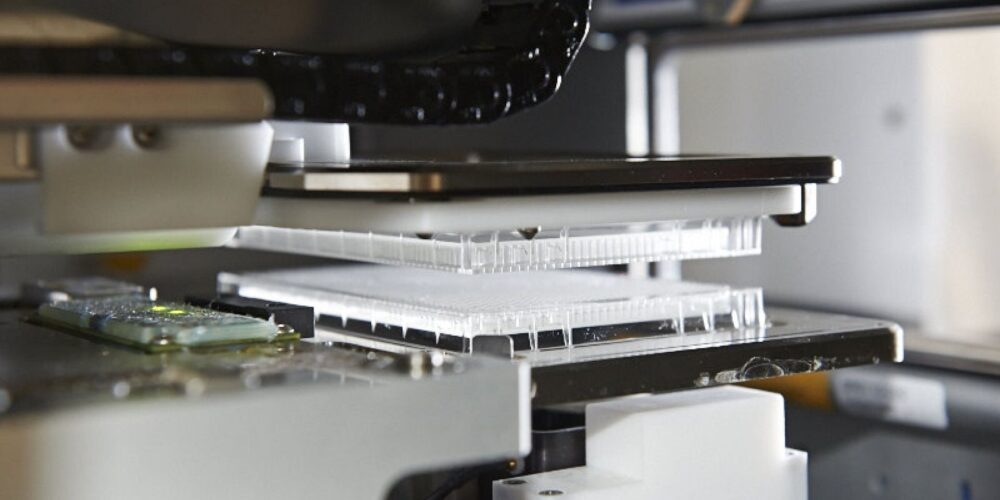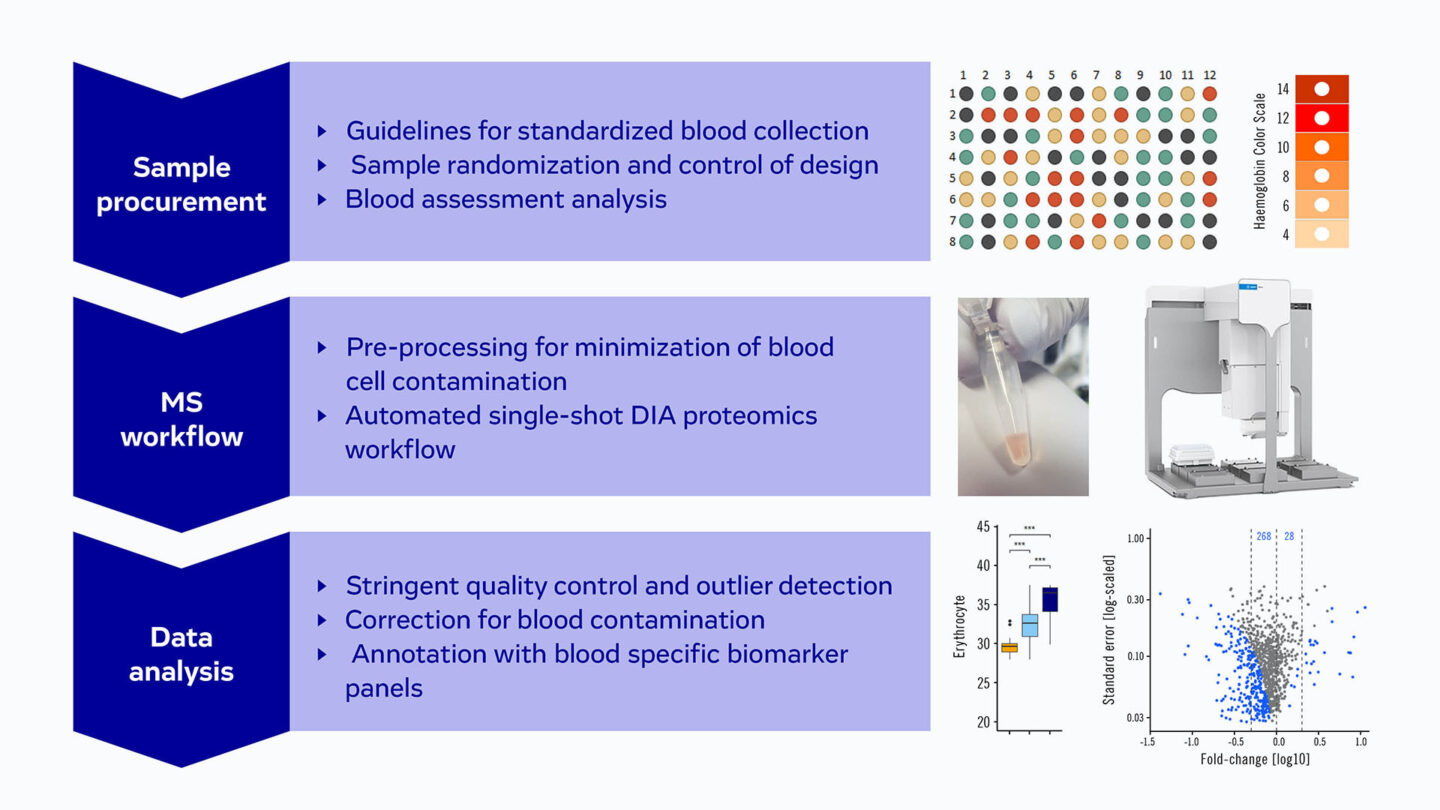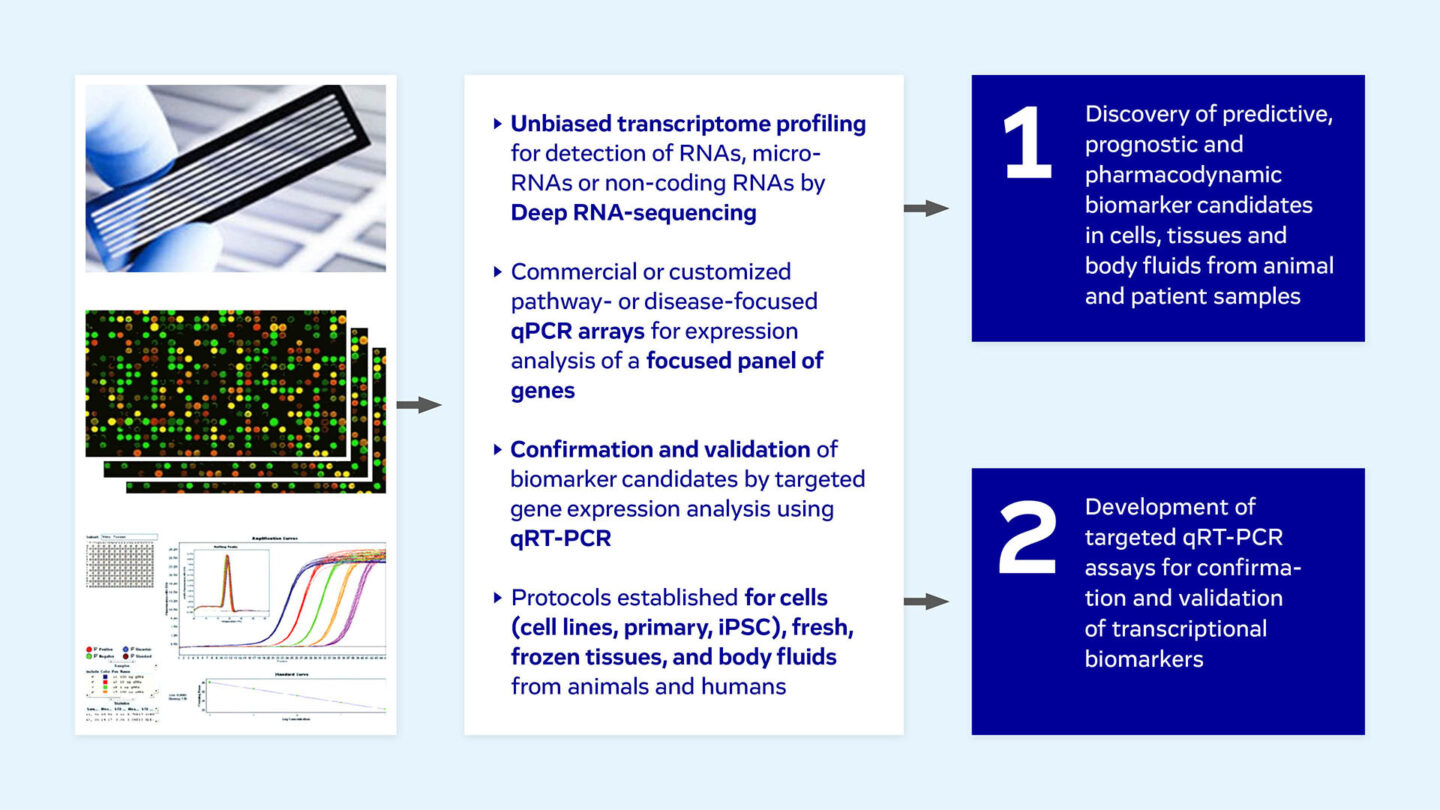
Biomarkers
Biomarkers are measurable biological parameters that help us understand how the body responds to diseases and treatments. They can be found in fluids or tissues and are detected using different techniques and technologies. Biomarkers are central to the paradigm shift happening in medicine as they provide insights into disease progression and prognosis, leading to a more precise and effective approach to healthcare. They aid early disease detection, monitor treatment responses, and contribute to drug discovery and development by confirming target engagement, assessing efficacy, as well as can be used for safety assessment.
Biomarker Discovery, Development & Validation
At Evotec, we discover and study biomarkers to reduce risks in drug discovery and development by finding new markers to show efficacy as well as testing specific ideas related to diseases. To validate the biomarkers, we use models that mimic diseases and, when possible, work directly with patient samples to ensure clinical translatability.
For example, we use biomarkers in oncology to define the best patients that will respond to a treatment by combining state-of-the-art techniques such as transcriptomics with immunohistochemistry: expression of a certain marker can tell us the patient will better respond to a treatment designed to alter such marker. In Neuroscience, we can use biomarker measurements, such as protein levels, to show that we reach the target in the central nervous system and trigger a disease-relevant response, for instance by measurement lowering of huntingtin levels in Huntington’s Disease subjects in cerebral spinal fluid. Or, as another example, biomarkers can aid in chronic kidney disease (CKD) by categorizing patients accurately based on their risk for adverse outcomes. Here, we leverage its multi-omics capabilities to analyze patient-derived samples obtained from the NURTuRE biobank, facilitating kidney disease drug discovery, and contributing to a transformative shift in the field using biomarkers.
Relying on our strong drug discovery expertise, we aim to identify for our partners:
- Target engagement, Pharmacodynamic, and (surrogate) efficacy biomarkers
- Stratification biomarkers to support the identification of a target patient population or a differential treatment response.
- Safety biomarkers to monitor safety aspects and enable dose selection in clinical studies
- Diagnostic tools or companion diagnostics
We have a longstanding experience in applying various techniques and technologies to support biomarker studies in any type of cell, body fluid, tissue. and animal model. These include, but are not limited to:
- Mass spectrometry-based proteomics and metabolomics
- Immunoassays, western blot, and flow cytometry
- Transcriptomics
- Imaging, immunohistochemistry, and radiography
Mass Spectrometry-based Proteomics & Metabolomics
Evotec offers a unique platform of innovative proteomics and metabolomics technologies to address key issues in translational biomarker discovery and validation in various therapeutic areas. Both the expertise and the sample and data processing infrastructure are in place for accurate quantification across large sample cohorts, enabling integrated, large-scale projects to discover and validate diagnostic, pharmacodynamic or predictive biomarkers.
Our Offering Comprises:
- Tailor-made automated workflows enabling deep proteome profiling for quantitative analysis across hundreds of samples or for detection of more than 10,000 proteins from cells or tissues
- In-depth and large-scale clinical proteomics programs allowing quantitative protein biomarker discovery in body fluid samples such as plasma, urine and CSF
- Full capabilities to develop targeted mass spectrometry assays based on multiple reaction monitoring (MRM) and parallel reaction monitoring (PRM) for high-throughput verification and validation of investigational biomarkers
- In vitro and in vivo targeted metabolomics enabling various preclinical and clinical translational biomarker applications
- Leading expertise in statistics, machine learning and bioinformatics for the identification and validation of univariate and multivariate markers in the context of relevant disease models or patient data
- Integrated quality management system ensuring industry standard sample logistics, handling and analysis as well as data generation and analysis

Immunoassays
Immunoassays are an indispensable technology to assess pharmacodynamics biomarkers. Combining high sensitivity with a relatively high-throughput, immunoassays are a well-suited method to measure protein levels and signaling events. Our knowledge and expertise in this area allows us to assist with the discovery of biologically and scientifically relevant biomarkers, as well as the measurement and interpretation of their changes in cellular models, animal models and ultimately patient samples across key therapeutic areas such as CNS, neurodegeneration, pain, inflammation, metabolic disease, oncology and immunology.
Evotec’s Versatile Immunoassay Platform
Protein Quantification
Having translatability in mind, we routinely develop, validate and apply ultra-sensitive protein biomarker quantification read-outs using state-of-the-art immunoassay technologies for hypothesis-driven biomarker research. Multiple technology options, such as single molecule counting Singulex technology, Quanterix technology, Mesoscale electro chemiluminescence or hTRF/TR-FRET allow for tailor-made approach to a gold-standard immunoassay.
Flow Cytometry and Elispot
Supporting primarily immunology and immuno-oncology focused projects, we apply flow cytometry approaches to evaluate drug mode of action and validate potential clinical markers. This includes the quantification of specific immune cell populations with diagnostic and/or prognostic significance using methods like FACS or ELISpot.
Western Blot
Supporting multiple indications, we apply Western Blotting in a new way. By using Simple Western technology, protein separation, immuno-detection, standardization, and data analysis has become automated and less error prone. Moreover, the new set-up allows for multiplexing which increases throughput and reduced timelines.
Transcriptomics
We offer both unbiased as well as targeted gene expression profiling for the discovery of predictive, prognostic and pharmacodynamic biomarker candidates in cells, tissues and body fluids from animals and humans and the development of qRT-PCR assays for the confirmation and validation of transcriptional biomarkers.

Imaging
The combination of in vivo pharmacology with imaging techniques offers a powerful tool to further analyze disease relevant biomarkers and assist in early risk assessments. Histology, immunohistochemistry (IHC) and radioligand binding are performed largely ex vivo and help to identify disease and target relevant changes. In contrast, optical and medical imaging can yield in life quantitative information amenable to statistical analysis, which adds significant value to our drug discovery efforts.
Immunohistochemistry and Histology
We integrate two leading ex vivo imaging platforms for biomarker studies, namely the Opera/Operette high-content imaging platform and the Ventana IHC platform. Experience includes the development of software solutions for quantification of labelling, and transfer of Ventana protocols with the clinic.
Ex Vivo Radioligand Binding Autoradiography
Functional responses using GTPγS radioligand binding and ex vivo receptor occupancy is monitored using state-of-the-art imaging technologies (Beta Imager & Phosphoimager) to determine protein localization.
Bioluminescence/Fluorescence
With the use of fluorescent probes and/or luciferase, we are able to monitor biological processes and track specific cell populations/markers in a living organism (specifically mouse).
MRI / PetScan
In collaboration with co-localized leading small animal imaging facilities, we access a combined functional-anatomic platform to validate clinical translation of specific biomarkers such as metabolites.
